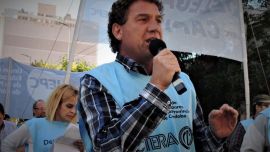In his last speech as head of state, President Alberto Fernandez on Friday rejected the drastic fiscal cuts proposed by his libertarian successor Javier Milei, to whom he will hand over power on Sunday.
"It is unreasonable to think of an adjustment that would halt our production and restrict employment and consumption that we have worked so hard to recover," Fernández argued as he assessed his four years in office, in a recorded ‘Cadena Nacional’ national broadcast on television.
Fernández delivered a long list of statistics and decisions in all fields taken under her administration, attempting to defend his government.
Argentina’s economy is currently rocked by more than 140 percent annual inflation and 40 percent poverty, yet it is also recording its highest level of industrial activity in six years" and has an unemployment rate of just 6.2 percent.
"We must take care that, under the argument of wanting to solve the fiscal problem, the rights of those who work are not violated and the aspirations of those who invest and produce are not frustrated," the outgoing Peronist leader emphasised.
Milei promised during his election campaign, and has ratified during the transition since he was elected, that he will attempt to cut at least five points of GDP off expenditure during 2024.
On Friday, the Clarín newspaper reported on a list of the adjustment measures designed by Milei to contain inflation, which include a ban on the Central Bank from issuing and financing the Treasury, a removal of subsidies to public services and a total freeze on state spending, including employees' salaries, among others. La Libertad Avanza did not formally confirm if the report was accurate.
In his speech Fernández insisted that the US$44-billion credit programme with the International Monetary Fund (IMF), signed by his predecessor Mauricio Macri, had decisively conditioned his administration and would affect Argentina "for generations."
He also mentioned the impact of the Covid-19 pandemic and the drought that hit agricultural activity in 2022-2023, depriving the country of some US$23 billion in exports and shaving three percent off GDP, according to economists.
"We know that we did not achieve the goals we set ourselves in strengthening income, fighting inflation and reducing poverty. Because the circumstances and the context did not accompany us and also because we should have done better or differently," Fernández said.
However, he also highlighted advances in areas such as civil rights, health, science and technology.
Fernández also acknowledged his failure in putting “an end to the grieta [“rift”] that separates us," alluding to the binary Peronist v anti-Peronist way of politicking that has dominated recent decades and helped bring Milei to power.
Towards the end of his speech, the president made rare mention of his second-in-command, Vice-President Cristina Fernández de Kirchner, who kneecapped then administration after anointing Fernández as the ruling coalition’s presidential candidate back in 2019.
"As Cristina always believed, I am convinced that we do politics that can transform the homeland,” declared President Fernández.
– TIMES/AFP





















Comments